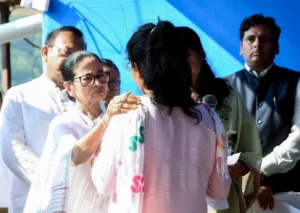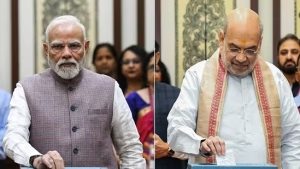West Bengal – West Bengal Chief Minister Mamata Banerjee delivered a stark Mamata Amit Shah warning on Wednesday, invoking one of Indian history’s most infamous cases of betrayal to caution Prime Minister Narendra Modi about his trusted lieutenant. The Trinamool Congress supremo compared the Union Home Minister to Mir Jafar, the military general whose treachery in 1757 changed the course of Indian history.
Speaking at Kolkata airport after returning from flood-ravaged north Bengal, Banerjee stated: “I want to tell Prime Minister Narendra Modi not to put too much faith in Amit Shah. He may one day become his Mir Jafar.”
The Historical Context of Mir Jafar

The Mamata Amit Shah warning draws upon a powerful historical parallel. Mir Jafar (1691–1765) was a military general who betrayed ruler Sirajuddaulah, the Nawab of pre-partition Bengal-Bihar, during the Battle of Plassey in 1757. This battle, which took place in present-day Nadia district of West Bengal, marked a turning point in Indian history.
The East India Company’s victory in that battle is widely regarded as the beginning of eventual British colonial rule over India. Following his betrayal, Mir Jafar remained monarch under British patronage for a period, serving as a puppet ruler. This historical reference adds significant weight to Banerjee’s cautionary message to the Prime Minister.
‘Acting Prime Minister’ Allegations


The Mamata Amit Shah warning extended beyond the historical comparison to include accusations about the home minister’s current conduct. Banerjee alleged that Amit Shah is “behaving like he is the acting Prime Minister of this country,” suggesting an overreach of authority within the government hierarchy.
“He is behaving like he is the acting Prime Minister of this country. But the PM is aware (of what he’s doing), I am sorry to say,” she alleged, directly addressing what she perceives as Shah’s expanding influence in governance matters.
Voter Roll Revision Controversy
The immediate trigger for the Mamata Amit Shah warning appears to be allegations regarding the Special Intensive Revision (SIR) of voter rolls in poll-bound states. Banerjee accused Amit Shah of manipulating the Election Commission into conducting this exercise, which she and other Opposition parties view as a systematic attempt to delete Muslim voters and others deemed unfavorable to the ruling party.
Bihar recently underwent such a revision, and now plans are underway for a nationwide revision, raising concerns among Opposition leaders about the integrity of electoral processes.
Questioning the SIR Exercise Timing
Expanding on her concerns, Banerjee questioned the feasibility and timing of the voter roll revision exercise. “Tell me, we are currently reeling under natural calamities, heavy rains, celebrating festivals and so on. Can the SIR exercise be completed within a fortnight and can fresh names be uploaded in that period under the current circumstances?” she argued.
Also Read: Mamata Banerjee Blames Dams for Man-Made North Bengal Floods
The West Bengal Chief Minister characterized the entire operation as “a game played by Amit Shah,” suggesting political motivations behind what should be a neutral administrative process.
Direct Appeal to Prime Minister Modi


The Mamata Amit Shah warning included a direct appeal to the Prime Minister, with Banerjee urging him to exercise caution in his relationship with the Home Minister. “We can request the Prime Minister not to trust Amit Shah always. One day, he will turn out to be your biggest Mir Jafar. Be alert while you have the time, because mornings tell you how the day will be,” she said.
This proverb-laden advice suggests that early signs of trouble should serve as warnings for what may come later, implying that Shah’s current actions might be precursors to future betrayal.
Political Context and Implications

The Mamata Amit Shah warning comes at a time of heightened political tension between the Trinamool Congress and the BJP-led central government. West Bengal has been a key battleground state, with fierce competition between the two parties in recent elections.
Banerjee’s statements also reflect broader Opposition concerns about the concentration of power in the hands of the Home Minister and alleged manipulation of democratic institutions, including the Election Commission.
Strategic Political Messaging
By invoking the Mir Jafar comparison, the Mamata Amit Shah warning serves multiple strategic purposes. It attempts to create a wedge between Modi and Shah, questions the Home Minister’s loyalty and motives, and positions Banerjee as someone offering sage advice to the Prime Minister while simultaneously attacking his closest political ally.
The historical reference also resonates deeply in Bengali consciousness, given that the Battle of Plassey occurred in Bengal and marked the beginning of colonial subjugation.
Implications for National Politics
The Mamata Amit Shah warning reflects the deteriorating relationship between the West Bengal government and the Centre, particularly on issues of federalism, election management, and minority rights. As Bihar prepares for elections and other states follow, these concerns about voter roll manipulation are likely to intensify.
Whether the Prime Minister heeds this warning or dismisses it as political rhetoric remains to be seen. However, the Mamata Amit Shah warning has certainly added a new dimension to India’s ongoing political discourse, using historical betrayal as a lens through which to view contemporary power dynamics within the ruling establishment.

